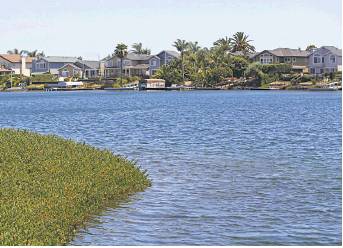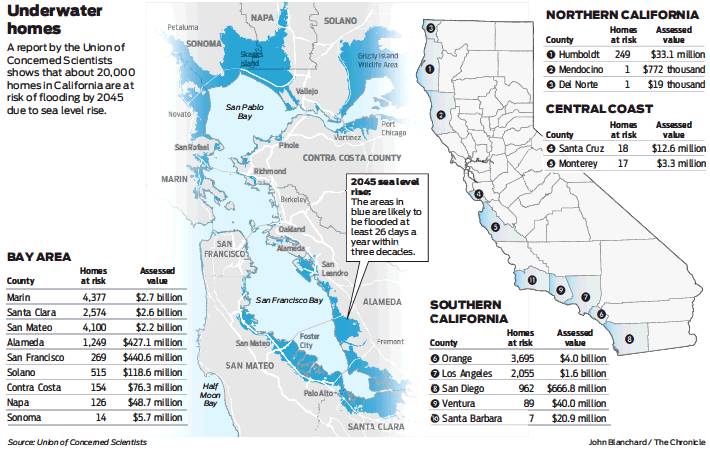Coastal homes may be flooded out by 2045
By Kurtis Alexander
That oceanfront property in Stinson Beach you’ve dreamed about may not be so perfect after all.
A report published Monday finds that nearly 4,400 homes in Marin County might not make it beyond a 30-year mortgage because of encroaching seawater.
According to the publication by the Union of Concerned Scientists, Marin County leads the state in the number of parcels that could literally be underwater by 2045 because of climate-driven sea level rise. Across California, more than 20,000 homes are at risk.
The report, among the most detailed evaluations of property nationwide that may be routinely flooded within a generation, offers not only a startling look a how quickly the issue of rising seas could confront coastal communities but also a stern warning for the real estate world.
“Currently, the real estate market largely doesn’t account for the near- and medium-term risk, which means a lot of coastal property is effectively overvalued,” said Kristina Dahl, senior climate scientist for the Union of Concerned Scientists and a co-author of the new report. “Some form of a market correction is inevitable as people’s perceptions of flood risk catch up with the reality.”
The findings are stark, in part because the authors use the federal government’s high-end projections for sea level rise. Dahl noted that the intention is to present a worst-case scenario for residents, given the stakes.
“Your home is typically your greatest asset, and most homeowners are pretty risk-averse when it comes to damage,” she said.
The report finds that across the continental U.S., about 311,000 homes are at risk of being inundated with seawater by 2045, or about $135 billion of assessed property. Florida, New Jersey and Louisiana, with their low-lying seaboards and sprawling coastal development, have the most to lose.
But California is not far behind. The 20,472 residential properties at risk over the next 30 years constitute more than $15 billion of assessed property.
After Marin, where the bay-front cities of San Rafael, Corte Madera and Larkspur face some of the greatest danger, San Mateo County counts the most threatened homes of any California county, about 4,100 by 2045, according to the report.
Orange County, Santa Clara County and Los Angeles County could also see significant losses.
The report considers property to be “chronically inundated,” and essentially unlivable, when it’s in an area that floods at least 26 times per year, or once every two weeks. With this amount of flooding, roads routinely close and water seeps into basements. Most residents won’t want to stick around, the authors said.
The authors took their cues on flooding frequency from the 2014 National Climate Assessment’s extreme estimates for sea level rise. By this measure, Bay Area waters will be 1.7 feet higher by 2045.
The high-end figures have become more popular with researchers as new studies suggest that oceans are rising more quickly than previously thought and many nations, including the United States, are doing too little to address the problem. The rising water is largely the result of ocean warming at the hands of climate change, which causes water to expand and glaciers to melt into the sea.
The report also extrapolates how property losses will affect the bottom lines of city and county governments, projecting big financial hits. Tax bases will decline as homes decrease in value or drop off the rolls entirely.
The more than 20,000 California homes at risk of flooding by 2045 contribute nearly $187 million in annual property taxes, according to the report. Communities with a large share of waterfront land, notably East Palo Alto, are likely to see the most significant losses.
The Union of Concerned Scientists is a national coalition of researchers that uses its work to advocate for policy change.
Alice Hill, a research fellow at Stanford University’s Hoover Institution who works on climate resilience and did not collaborate on the new report, said she agrees that coastal communities need a wake-up call.
“I do not think Americans are appreciating what’s fully at stake here,” she said.
Hill, whose experience includes working for the Department of Homeland Security and the White House on climate issues, likened the potential flooding of huge swaths of property to the real-estate market crash a decade ago. Home values tanked and countless property owners lost money, often defaulting on their mortgages.
“When we had the meltdown in 2008, people could stay in their homes and they did,” Hill said. “With this issue, they can’t stay there. They will walk away and move, and those properties will be valueless.”
The report notes that quick action on climate change would significantly reduce the extent of property loss.
States like California are taking steps to curb the heat-trapping gas emissions behind global warming while many communities are making preparations for higher water.
Last week, San Francisco leaders agreed to put a $425 million bond on the November ballot for upgrading the three-mile seawall along the city’s Embarcadero. Already, voters across nine Bay Area counties have approved a 20-year parcel tax that is raising money to restore coastal habitat and help buffer the impact of rising seas.
Also, a handful of communities, including Marin and San Mateo counties, are suing many of the world’s largest oil companies for their role in climate change, hoping to win money to pay for the waterproofing.
Chris DeNike, an agent with Zephyr Real Estate in Green-brae, said sea level rise is not something he finds on the minds of home buyers and sellers. They may have more urgent concerns.
“In my 20 years, no one has ever brought that up,” DeNike said. “If it is a concern, it’s not being spoken about.”
Kurtis Alexander is a San Francisco Chronicle staff writer. Email: kalexander@sfchronicle.com Twitter: @kurtisalexander

